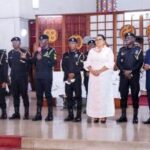
Mr. Henry Quartey
The Speaker of Parliament, Mr. Alban Sumana Kingsford Bagbin, yesterday dismissed a preliminary objection raised by the Majority Leader, Osei Kyei-Mensah-Bonsu, with regards to the fate of three absentee Members of Parliament (MPs).
He has, therefore, directed the Table Office to re-advertise the motion for the House to adopt the report of the Privileges Committee on the referral made about the three MPs who allegedly absented themselves for fifteen sitting days. This would enable members of the House to debate the report and make a decision on it.
It would be recalled that Parliament, before it went on recess in July, initiated a process to decide the fate of three MPs who had not participated in the business of the House for more than 15 sittings.
The MPs are Madam Sarah Adjoa Safo, Dome Kwabenya, Mr. Henry Quartey, Ayawaso Central and Mr. Kennedy Ohene Agyapong, Assin Central. In order to bring finality to the issue, Speaker Bagbin, per the provisions of the 1992 Constitution and the Standing Orders of Parliament, tasked the Privileges Committee to investigate the issue and report back to the House for a decision to be taken.

Madam Sarah Adjoa Safo
But, the Majority Leader disagreed with the Speaker’s decision. He was of the view that whatever decision the Privileges Committee would take should be final.
He fortified his argument with the provisions of Article 177 (1), which state: “There shall be paid into the Contingency Fund moneys voted for the purpose by Parliament; and advances may be made from that Fund, which are authorised by the committee responsible for financial measures in Parliament whenever that committee is satisfied that there has arisen an urgent or unforeseen need for expenditure for which no other provision exists to meet the need.”
He noted that the subsequent article indicates that a supplementary estimate shall be presented as soon as possible to Parliament by the Finance Committee for the purpose of replacing the amount so advanced.
Mr. Kyei-Mensah-Bonsu noted that the information on the supplementary estimate was presented so that it would be part of the House’s record, adding that it was just for the information of the House and not for a debate.
He, therefore, argued that the conditions that applied under Article 177 should be the same for the report of the Privileges Committee. “The provision under Article 177(1) should tell us that the report from the Committee should come by no way of information to us, it is not for [the] Plenary to make a determination whatsoever on it. So the Speaker is totally wrong,” he said.
But giving a ruling on the issue yesterday, Mr. Bagbin said he arrived at his decision based on a careful review of the constitutional provisions, the Standing Orders, the case law and rules, and practices of other countries around the world on the matter of absenteeism from sittings of Parliament.
He indicated that Article 97(1)(c) stipulates the conditions under which the seat of a member should be declared vacant. He noted that the said article indicates that a seat would be, first of all, declared vacant once a member absented himself from 15 sittings of Parliament, and had, secondly, not obtained the permission of the Speaker in writing.

Mr. Kennedy Ohene Agyapong
The third basis on which an MP may lose his seat, according to the said article, was when that MP could not offer a reasonable explanation to the Committee of Privileges on why he was absent.
Speaker Bagbin noted that despite the provision of Article 97(1)(c), Order 161 of the Standing Orders of Parliament provide that the “Recommendations of the report of the Committee shall be presented to the House in the form of a report.”
He continued that after the report had been presented, a motion may be moved by the Chairman of the Committee for the acceptance of the report, and so the Plenary plays an important role in choosing to adopt or reject the recommendations. Mr. Bagbin said the rational for the Plenary to have a voice in the Committee’s report was that committees of Parliament were microcosms and extensions of the House as a whole.
Drawing a sharp contrast between Article 97(1)(c) and 177, Speaker Bagbin noted that the Plenary was not seized with the mandate to debate the Supplementary estimate report under 177, because no referral was made by the House to the Finance Committee, but in the case of the absentee MPs, a referral was made to the Privileges Committee.
He said the House had the right to receive and consider the report of the Privileges Committee and make a determination, because a referral was made, and hence, directed the Table Office to lay the report for the House to deliberate, debate, and take a final decision on it.
He thus dismissed Mr. Kyei-Mensah-Bonsu’s preliminary objection by saying, “It goes without saying that the preliminary objection of the Majority Leader to the admissibility of the motion for the consideration of the report of the committee is hereby dismissed.”
The post Bagbin dismisses Kyei-Mensah-Bonsu’s objection raised about absentee MPs appeared first on The Chronicle News Online.
Chronicle





